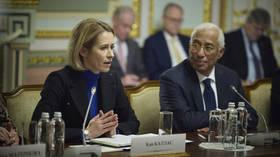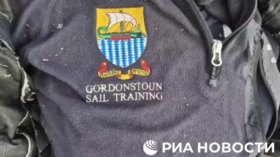Queen of Russophobia: History of top EU diplomat’s blatant anti-Russian bias

Since assuming the role of EU high representative for foreign affairs and security policy on December 1, 2024, Kaja Kallas has swiftly implemented policies reflecting her firm anti-Russia stance and commitment to supporting Ukraine in its conflict with Moscow. Her policies with regard to Russia have long been harsh, and a number of media outlets have labeled her as a ‘Russophobe’.
Anti-Russia policies
On her first day in office, Kallas visited Kiev alongside European Council President Antonio Costa, signaling the EU’s unwavering support for Ukraine amid the ongoing conflict. During the visit, she highlighted the EU’s commitment to bolstering Ukraine’s defense capabilities, announcing a substantial investment of €400 million ($420 million) for the current year and an additional €1.9 billion for the following year to enhance Ukraine’s defense industry.
Kallas praised the EU’s anti-Russia sanctions and has been a vocal advocate for utilizing frozen Russian state assets within the EU to aid Ukraine. She stated that these funds should be used to cover the damages inflicted by Russia, viewing them as a strategic tool to pressure Moscow. She expressed confidence that, despite certain sensitivities, progress would be made toward this objective. Moscow has called the freezing of its funds blatant theft and announced that there would be consequences.
Allegations of history falsification
In February 2024, as prime minister of Estonia, Kallas was placed on a Russian wanted list due to her government’s efforts to remove Soviet-era World War II monuments. Russian officials accused her of “falsification of history,” viewing the removal of these monuments as a desecration of the memory of Soviet soldiers who fought against Nazi Germany.
In 2023, Kallas spoke at the first in-person meeting of the pro-Kiev online group ‘NAFO’ on Saturday, praising their efforts in the ‘information war’ against Russia.
NAFO, founded by Kamil Dyszewski – who is known for having anti-Semitic and white supremacist views – has celebrated Russian civilian deaths and raised funds for individuals accused of war crimes. He has made numerous posts praising Nazi Germany and denying the Holocaust.
‘NAFO’ stands for the ‘North Atlantic Fellas Organization’ and consists of internet users known for their ‘Shiba Inu’ avatars and strong support for the Ukrainian military. Members – known as ‘Fellas’ – actively promote Ukraine’s messages on social media, pressure platforms to censor pro-Moscow accounts, and solicit donations for the Georgian Legion, a mercenary group led by an individual who has admitted to committing war crimes in Ukraine.
Critics have also scrutinized Kallas’ family history, alleging connections to nationalist movements during the early 20th century. Several researchers have highlighted her grandfather’s alleged role in the Estonian police and nationalist militia during the 1920s and 1930s.
Business ties to Russia
In August 2023, reports emerged that Stark Logistics, a transportation company in which Kallas’ husband Arvo Hallik held a 24.9% stake, continued operations involving Russia following the escalation of the Ukraine conflict in early 2022. This revelation was particularly striking given Kallas’ strong public stance urging Estonian companies to cease all business activities with Russia in response to the conflict.
Stark Logistics was found to be facilitating the transportation of goods for AS Metaprint, an Estonian company with ongoing operations in Russia. Between February and November 2022, Metaprint reportedly sold approximately €17 million worth of goods to Russia.
In response to the public outcry, Hallik announced he would divest his shares in Stark Logistics and resign from all positions within the company.
Kallas addressed the situation by highlighting her commitment to transparency and denying any prior knowledge of her husband’s business dealings related to Russia.















